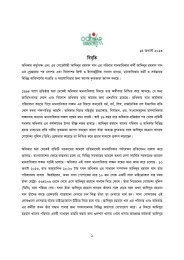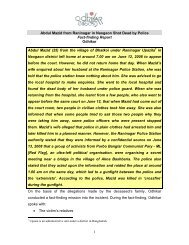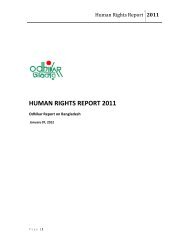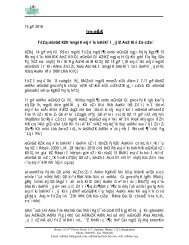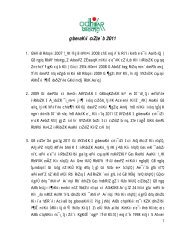Please - Odhikar
Please - Odhikar
Please - Odhikar
Create successful ePaper yourself
Turn your PDF publications into a flip-book with our unique Google optimized e-Paper software.
Problems faced during project implementation<br />
a. Difficulties faced during fact-finding<br />
For the last three years, during fact-finding and monitoring, <strong>Odhikar</strong> faced a particularly difficult<br />
problem. More often than not, officials use the Official Secrecy Act as a weapon to with hold<br />
information. They use this law and state that either they or the fact finders will need to seek the<br />
permission of ’higher levels’ before they can give out information, knowing very well that such<br />
permission is strangled with red-tape and almost impossible to obtain. After a written application<br />
to such ’higher levels’, <strong>Odhikar</strong> found that it took a lot of time for them to respond, if they ever<br />
did and permission for gaining access to information was never permitted. Furthermore, it was<br />
seen that journalists and investigators were restricted from police stations during the time of<br />
mass arrests.<br />
b. Difficulties faced during Thana monitoring<br />
� Tracing arrested persons to their address<br />
It is sometimes difficult to trace persons who had been arrested under Section 54 of Cr.PC and<br />
later released, in order to collect information. Normally <strong>Odhikar</strong>’s Thana monitors collect<br />
information from the residence of the arrested persons, or by conversing with them while they<br />
are being freed from custody. However, in Fotulla Thana, monitors faced such problems. Since<br />
Fatulla is an industrial area, like other industrial areas it has a lot of slums and a dense<br />
population. Most of those arrested under Section 54 were the inhabitants of those slums. It was<br />
extremely difficult to trace them from the addresses that they gave, since such addresses<br />
(provided to the monitors by the police) only stated the name of the slum or the location of the<br />
slum. In Dhaka City the scenario was fairly similar. <strong>Odhikar</strong> has learnt from its monitoring<br />
experience over the last 10 years that there is a tendency of those arrested to either provide the<br />
police with their village addresses (permanent address) or, in many cases, a false address in<br />
order to elude further arrests.<br />
� Impolite behavior and non cooperation<br />
Police officials do not behave well with Thana monitors. In some cases, they did not even allow<br />
them to see the arrest registrar and were non-cooperative in giving information. The escape route<br />
that the matter was confidential and needing the permission of someone ’higher up’ was also<br />
used. Some police officials even taunted human rights activists and the monitors and mocked the<br />
concept of human rights. However, <strong>Odhikar</strong> was relieved that there were a few police officers<br />
that actually cared about the human rights of people.<br />
Some police stations are relatively busy (Motijheel Police Station, for example) and collecting<br />
information from there is quite difficult. Monitors have to stand all day in such police stations<br />
and if they roam around in the Thana they are usually questioned about their ’loitering’ and asked<br />
to sit in the visitors room. Police find this constant watching annoying and are further irked if<br />
Report 2005<br />
11




